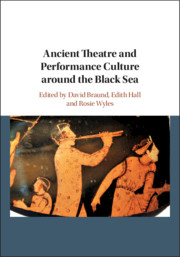Book contents
- Ancient Theatre and Performance Culture around the Black Sea
- Frontispiece
- Ancient Theatre and Performance Culture around the Black Sea
- Copyright page
- Contents
- Figures
- Notes on Contributors
- Preface
- Abbreviations
- Map
- Part I Approaches
- Part II Places
- Part III Plays
- 11 Space, Place and the Metallurgical Imagination of the Prometheus Trilogy
- 12 Fragmentary Greek Tragedies Set in the Black Sea
- 13 Black Sea Back Story: Euripides’ Medea
- 14 Dare to Believe: Wonder, Trust and the Limitations of Human Cognition in Euripides’ Iphigenia in Tauris
- 15 Visualising Euripides’ Tauric Temple of the Maiden Goddess
- Part IV Performative Presences
- Epilogue: Dancing around the Black Sea: Xenophon, Pseudo-Scymnus and Lucian’s Bacchants
- References
- Black Sea Index
11 - Space, Place and the Metallurgical Imagination of the Prometheus Trilogy
from Part III - Plays
Published online by Cambridge University Press: 12 November 2019
- Ancient Theatre and Performance Culture around the Black Sea
- Frontispiece
- Ancient Theatre and Performance Culture around the Black Sea
- Copyright page
- Contents
- Figures
- Notes on Contributors
- Preface
- Abbreviations
- Map
- Part I Approaches
- Part II Places
- Part III Plays
- 11 Space, Place and the Metallurgical Imagination of the Prometheus Trilogy
- 12 Fragmentary Greek Tragedies Set in the Black Sea
- 13 Black Sea Back Story: Euripides’ Medea
- 14 Dare to Believe: Wonder, Trust and the Limitations of Human Cognition in Euripides’ Iphigenia in Tauris
- 15 Visualising Euripides’ Tauric Temple of the Maiden Goddess
- Part IV Performative Presences
- Epilogue: Dancing around the Black Sea: Xenophon, Pseudo-Scymnus and Lucian’s Bacchants
- References
- Black Sea Index
Summary
This chapter takes as its springboard the cognitive stimuli of the Prometheus opening scene, both the visual and aural experience of metal pounding on metal and the heavily symbolic space of Prometheus’ shackling, and explores their meaning more widely in relation to each other, to the entire play and to the trilogy as a whole. It examines the possibility that the evocation of metalworking through sight and sound and the choice of spaces in the Prometheus Bound and in its trilogy are suggestive of the importance of metallurgy and metalworking in the Athenian imagination in relation to the areas surrounding the Black Sea. As will be argued, the Black Sea was perceived by the Greeks as an area rich in mineral ores and even richer in the knowledge of the wondrous art of metallurgy. In light of the deep symbolism that the collective imagination had attached to metallurgy for millennia, and especially to the significance of metal in the creation of the order of the cosmos, the choice of spectacle and spaces in the Prometheus trilogy offers further evidence of the way the Black Sea was imagined by fifth-century Greeks. This, in turn, may contribute to better understandings of the play’s meaning and, possibly, to the lost trilogy’s meaning as a whole.
- Type
- Chapter
- Information
- Ancient Theatre and Performance Culture Around the Black Sea , pp. 225 - 251Publisher: Cambridge University PressPrint publication year: 2019
- 1
- Cited by



